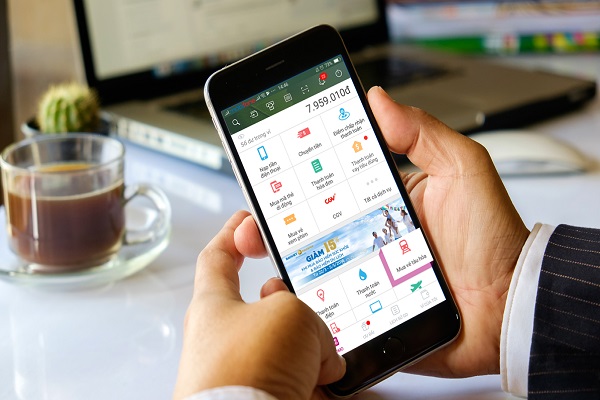Ms. Quyen, a parent whose child attends a secondary school in Hanoi, said she was forced to install a less-used e-wallet because her child’s school linked up with this e-wallet to collect tuition fees. While her smartphone already had several other e-wallets installed – some e-wallets offer promotions and discount vouchers to attract customers and these are also more popular e-wallets.
Ms. Chi, a person who is quite enthusiastic about electronic payment, also said that she often pays her electricity bill through an e-wallet integrated into a ride-hailing software. However, this e-wallet does not connect to the clean water service provider that her family is using, so she has to install another e-wallet. Therefore, just to pay for electricity and water, she has to install two e-wallets, not to mention other services.
In addition, because she also wanted to participate in promotional programs to attract users, Ms. Chi also installed a few other e-wallets to use. However, there was an e-wallet she intended to use, but the bank she used was not yet connected to that wallet.

There are currently more than 40 e-wallets on the market. Photo: DNCC
Up to now, the market has more than 40 e-wallets licensed to provide services. Although the market has a few wallets that dominate the majority of the market share, the "game" continues to see new wallets appear recently. 2 years ago, the 9Pay e-wallet was launched because investors believed that the e-wallet market still had a lot of room for development. This e-wallet announced that it had reached 1 million users after 1 year of launch.
A representative of the 9Pay e-wallet said that during the Covid-19 pandemic, online entertainment services such as watching movies and paying for online game services increased sharply, and 9Pay has continuously had marketing campaigns focusing on this area. Born later, 9Pay chose its own path in the field of payment for digital content and entertainment services with the goal of leading payment in this area.
The representative of Viettel Pay e-wallet commented that the e-wallet market in Vietnam is a vibrant, competitive playground with diverse approaches to users. Currently, there are many wallets participating in the market but there are still many unexploited gaps. The number of wallets that really have an impact on the market is stopping at different segments.
Recently, more foreign wallets have joined the market. Specifically, in mid-November, Google joined hands with Visa to provide Google Wallet e-wallet in the Vietnamese market. Accordingly, Visa cardholders as well as Mastercard cardholders of some banks can add payment cards to the wallet.
The reason the two companies are cooperating to provide this e-wallet service in Vietnam is because Visa's research on consumer payment attitudes in 2021 shows that more than 80% of consumers prefer to make payments using mobile devices. In Vietnam, up to 75% of consumers use contactless payments via mobile phones at least once a week and half of those who have not yet accessed this payment method are interested in trying it out.
According to the e-Conomy SEA 2022 report, digital payments are becoming popular and are expected to reach US$143 billion in total transaction value in Vietnam by 2025. Currently, millions of Vietnamese people use their phones every day to make payments.
Speaking to KTSG Online , Mr. Can Van Luc, a member of the National Monetary and Financial Policy Advisory Council, said that the Vietnamese market is not saturated and there are still many opportunities for e-wallets... According to Statista, the Vietnamese digital payment market will reach a value of about 15 billion USD in 2021, an increase of 30% compared to 2020 and this rate will be maintained for at least the next 5 years.
A representative of ZaloPay e-wallet said that the number of 43 e-wallets in Vietnam is not much compared to other countries in the region (Malaysia has 53 wallets, or Indonesia has 48 wallets). The growth in the number of e-wallets comes from the huge potential of the market when the rate of e-wallet usage in Vietnam is just over 20% - much lower than Korea, Taiwan, and China, which are all above 70%.
According to Mr. Hoang The Thanh, General Director of Bao Kim E-commerce Joint Stock Company, only a few units will account for the majority of the market share. The remaining wallets have a small number of users, only using the wallet to meet the exact service that the unit has an advantage in, such as ordering food or shopping online...
The market determines the number of wallets
Analyzing the reasons why the e-wallet market is "blooming", Mr. Thanh said that it is not without reason that units apply for licenses in the context of many businesses already providing services. Right from the time of forming the business and applying for licenses, they have a plan of where to go in this potential but also fierce market.
According to him, small wallets can choose to become a payment platform for a foreign company that invests in Vietnam and needs a license. Or there are wallets that try to develop a customer base in markets that other wallets have not yet reached, so that one day they will become a part of that large wallet. Therefore, Mr. Thanh said that the merger and acquisition of e-wallets is an ongoing issue.
There have been opinions that with a population of 100 million people, Vietnam has licensed more than 40 e-wallets to operate, leading to competition and waste of social resources. Talking to KTSG Online , Mr. Nguyen Dinh Thang, Chairman of the Vietnam Digital Technology Startup Investment Club, said that the number of wallets may exceed people's needs. Because many users use new wallets (download new apps) because of promotions, but if used regularly, only one wallet is needed.
Despite sharing as above, Mr. Thang thinks that in the early stages of development of the e-wallet market, many investment units are good. Because during the operation process, some wallets will be eliminated because users will choose the most convenient wallet, the best experience. Users will decide for themselves which wallet will exist, so let the market decide. State policy should not intervene by prohibiting or limiting the number of e-wallets operating in the market.
Providing information to the press, Mr. Nguyen Tuan Luong, Vice Chairman of the Board of Directors of VNPay, said that with more than 40 e-wallets in operation, there will be fierce competition. The more vibrant and powerful the competition, the more users will benefit. E-wallets that own an ecosystem that fully serves daily needs will attract more users.
To not waste social resources
Proposing policies to develop e-wallets, Mr. Dao Tuan Anh, CEO of AppotaPay, said that e-wallets should work together and cooperate to create common habits. Because he believes that the biggest competition of e-wallets is not between wallets but with cash. It is difficult for a single e-wallet to have enough human and financial resources to successfully convert the majority of cash transactions that are currently very large.
“If e-wallets come together to find a solution and can offer common payment tools to users, this can help increase service accessibility and market acceptance, then the payment system can increase many times over,” said Mr. Tuan.
Back to the story of Ms. Quyen and Ms. Chi mentioned at the beginning of this article and also the desire of many other e-wallet users, they want to be able to use one or two wallets to pay for many different services. This is both convenient for users and less wasteful of resources for society (each wallet does not have to connect to banks and form its own payment points).
But in reality, it is impossible for a wallet to connect with all service providers. Therefore, technology experts say that if a wallet is to be able to pay for many different services, the wallets must be connected and interconnected. The State Bank needs to have a mechanism and direction so that e-wallets can connect, just like in the past, a bank card could only withdraw money at the ATM of that bank, but now every bank card can withdraw money at every ATM.
Technology experts say that, in terms of technology, wallets can be completely interconnected to facilitate payments for users. However, to do this, there needs to be policies and directions from the State Bank.
Under the impact of Covid-19, electronic payments have grown at a three-digit rate. In particular, electronic payment transactions in the fields of public administration, schools, hospitals, and electricity and water have increased sharply. However, many users are still negligent in protecting their e-wallets, leading to the money in their accounts being able to 'evaporate' without them knowing.
According to statistics, currently more than 85% of Vietnamese consumers own at least one e-wallet or payment application, over 42% have made contactless payments using mobile devices. These figures show that Vietnam is making strong strides towards a cashless society and the number of people participating in cashless transactions is expected to continue to increase in the near future.
Along with electronic banking transactions, e-wallets are becoming a popular service for users. However, this type also comes with risks if users do not really know how to secure information. There have been cases where customers suddenly lost hundreds of millions of dong overnight. In fact, customers are taken advantage of by criminals to take money from their e-wallets partly due to lack of vigilance.
 Cashless consumption is the future transaction trendAFP |
A recent example was a customer who logged into his e-wallet account to top up his phone, but forgot his password. The customer called the e-wallet's hotline for support, but the line was busy. Then, a strange phone number called the customer's phone and claimed to be a consultant from the hotline, helping to retrieve his password and asking to read the code sent via text message. Immediately after providing the code, a large amount of money was "evaporated" from the customer's account when his e-wallet was linked to his bank account, from which the fraudster could withdraw money from the wallet or purchase phone card codes.
Updating and equipping with the necessary knowledge to master transactions and avoid becoming victims of fraud is always a top concern not only for consumers but also for experts and activists in this field to promote a clean and developing cashless consumption environment.
Mr. Ngo Tran Vu, CEO of Nam Truong Son Security Company Limited (NTSS), commented: "Online fraud is increasing and becoming a big 'business' for cyber criminals. In Vietnam, the common fraud scenario and technique is: hackers trick victims into clicking on fake pages, taking over accounts, then tricking their friends, or impersonating police officers to ask for personal information and get OTP codes."
Source
























![[Photo] National Assembly Chairman Tran Thanh Man visits Vietnamese Heroic Mother Ta Thi Tran](https://vphoto.vietnam.vn/thumb/1200x675/vietnam/resource/IMAGE/2025/7/20/765c0bd057dd44ad83ab89fe0255b783)











































































Comment (0)